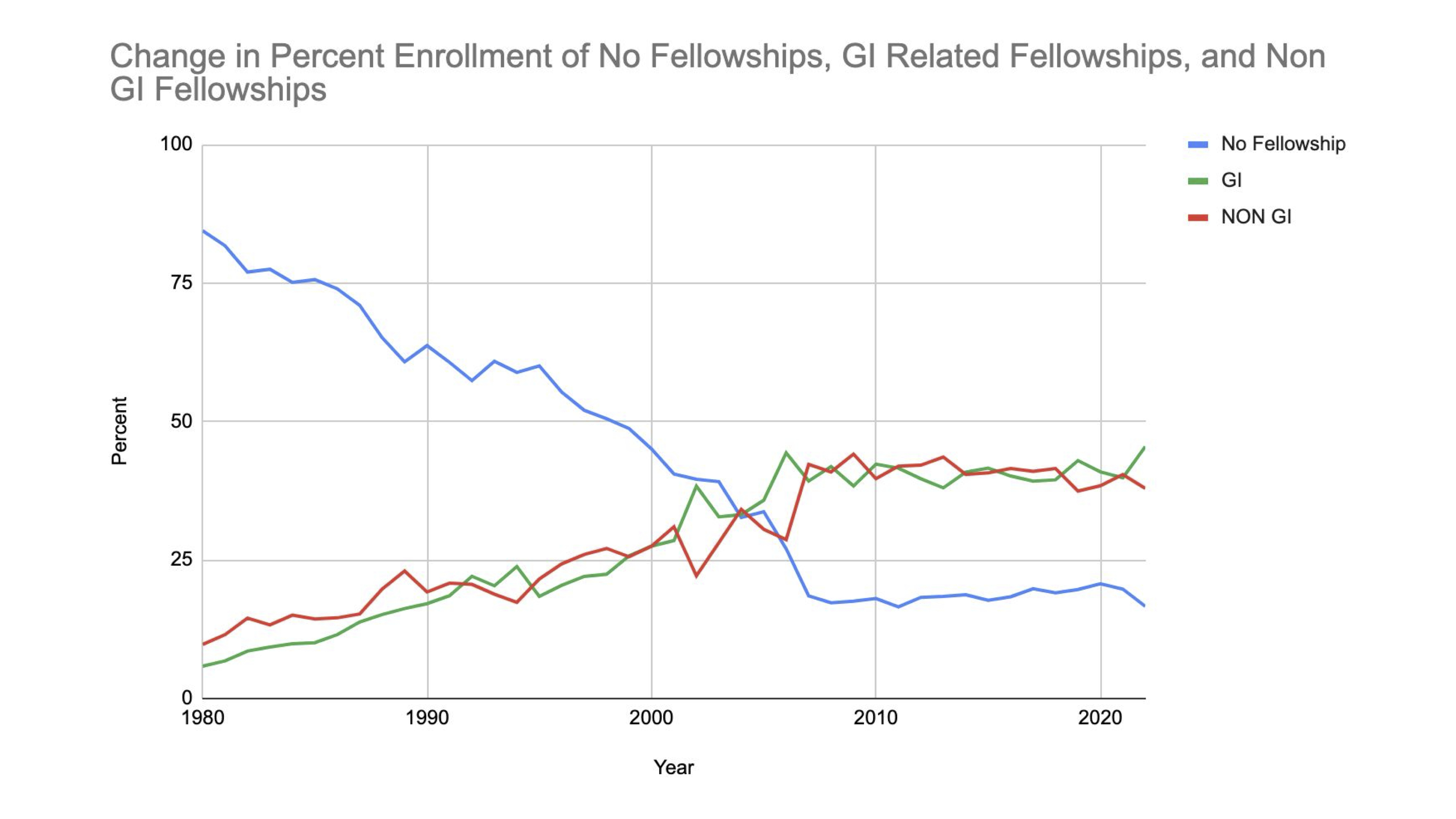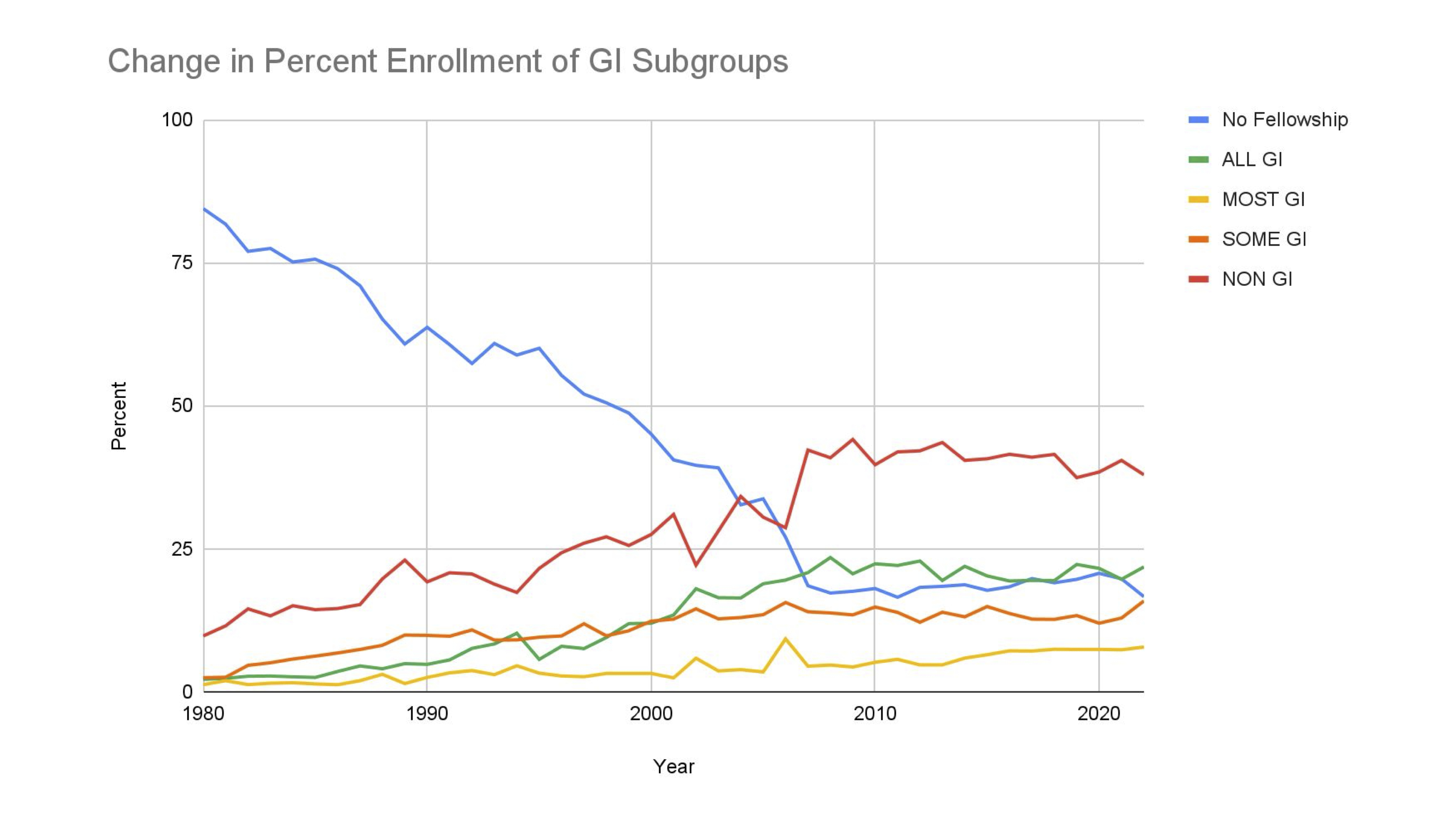Back to 2024 Abstracts
THE RISE OF GI SURGICAL FELLOWSHIPS
Veer S. Sawhney
*, Priyanka V. Chugh, Gordana Rasic, Alaina Geary, Luise Pernar, Jennifer S. Davids, Sing Chau Ng, Teviah Sachs, Kelly Kenzik, Jennifer F. Tseng
Boston Medical Center, Boston, MA
Introduction:GI and abdominal wall surgery are core components of general surgery. Increasingly, residents are pursuing fellowship after completing general surgery residency for reasons including desired subspecialty and/or perceived readiness for practice. We sought to determine what proportion of graduating general surgery residents pursue fellowships related to the GI tract and abdominal wall.
Methods:Publicly available data from the American Board of Surgery (ABS) was used to quantify rates of ABS-certified surgeons with fellowship training. Publicly available data from the Fellowship Council (FC) was used to quantify rates of non ACGME accredited fellows. Data were categorized by the degree of fellowship-level GI-specific training: 1) No fellowship, 2) ALL GI (Advanced GI, Bariatric, Colon and Rectal, Endoscopy, Hepatobiliary, Minimally Invasive), 3) MOST GI (Acute Care, CGSO, Oncology), 4) SOME GI (Pediatric, Thoracic, Transplantation), and 5) NON GI (Breast, Critical Care, Endocrine, Hand, Other, Plastic, Trauma Burns, Vascular). Additionally, non ACGME Minimally Invasive & Gastrointestinal Surgery fellowships were considered ALL GI. Non ACGME Advanced Colorectal and Thoracic Surgery fellowship data was combined and therefore considered MOST GI. Trends were statistically analyzed using Mann Kendall tests.
Results:In 1980, GI related surgeons (i.e. ALL + MOST + SOME GI) made up 5.8% of applicants for initial ABS fellowship certification, while 84.5% of surgeons did not pursue any fellowship training. In 2022, this number had substantially increased to 45.5%, and with non ACGME GI related fellowships included, it is even higher at 56.3%, while those pursuing no fellowship has fallen to a mere 16.6%.
There were statistically significant increasing trends over time for all fellowships (p<0.0001), except for non ACGME Advanced Colorectal and Thoracic Surgery fellowships, and a significant decreasing trend for No Fellowship (p<0.0001).
When comparing ALL, MOST, and SOME GI, ALL GI training demonstrated the largest increase from 2.2% of fellowships in 1980 to 21.8% in 2022, and 35.9% when including non ACGME fellowships. The largest increases in enrollment in individual fellowships were in Colon and Rectal (1.2% in 1980 vs 8.7% in 2022) and Minimally Invasive (0.3% in 1980 vs 8.2% in 2022) fellowships.
Conclusions:Over time, there has been a significant increase in surgeons pursuing additional training in GI related fields, especially Colon and Rectal and Minimally Invasive Surgery. Additional investigation is necessary to determine if this is secondary to exposure in residency and/or increasing complexity of operations. However, our data suggest that even with the rise of fellowships, general surgery residents continue to seek careers focused on the GI tract, which remains at the core of the surgical field.

Figure 1: Change in percent of total general surgeon population, GI, and non GI fellowships over time (ABS data only)

Figure 2: Percent change of enrollment in GI Fellowship Subgroups over time (ABS data only)
Back to 2024 Abstracts

